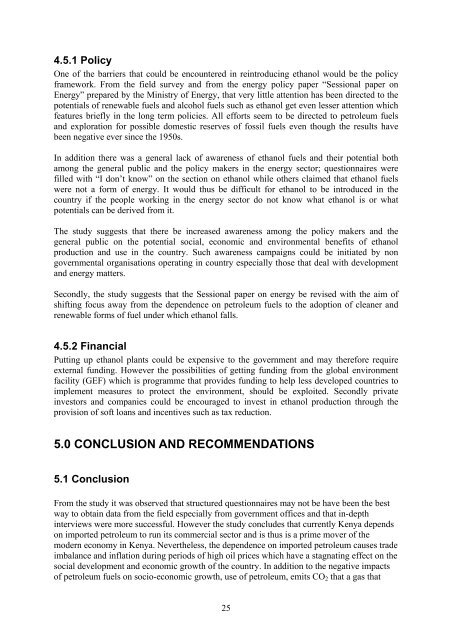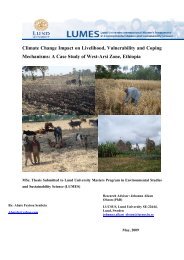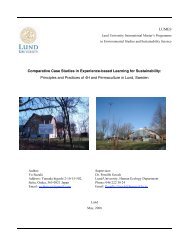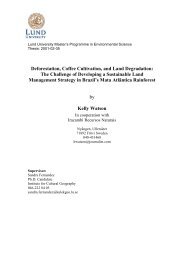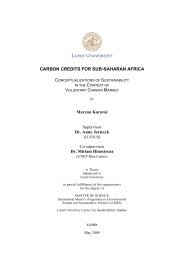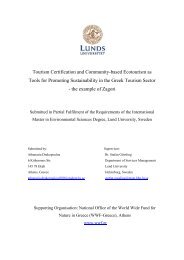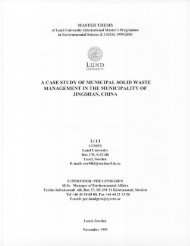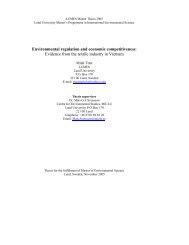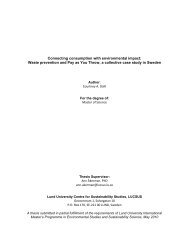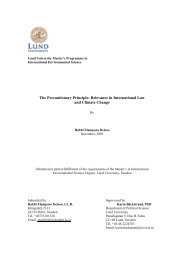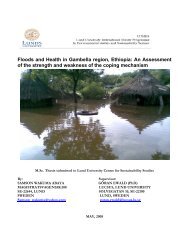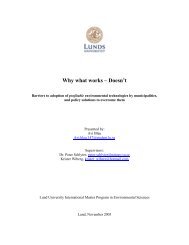ethanol fuel production and use in kenya for sustainable ... - lumes
ethanol fuel production and use in kenya for sustainable ... - lumes
ethanol fuel production and use in kenya for sustainable ... - lumes
Create successful ePaper yourself
Turn your PDF publications into a flip-book with our unique Google optimized e-Paper software.
4.5.1 PolicyOne of the barriers that could be encountered <strong>in</strong> re<strong>in</strong>troduc<strong>in</strong>g <strong>ethanol</strong> would be the policyframework. From the field survey <strong>and</strong> from the energy policy paper “Sessional paper onEnergy” prepared by the M<strong>in</strong>istry of Energy, that very little attention has been directed to thepotentials of renewable <strong>fuel</strong>s <strong>and</strong> alcohol <strong>fuel</strong>s such as <strong>ethanol</strong> get even lesser attention whichfeatures briefly <strong>in</strong> the long term policies. All ef<strong>for</strong>ts seem to be directed to petroleum <strong>fuel</strong>s<strong>and</strong> exploration <strong>for</strong> possible domestic reserves of fossil <strong>fuel</strong>s even though the results havebeen negative ever s<strong>in</strong>ce the 1950s.In addition there was a general lack of awareness of <strong>ethanol</strong> <strong>fuel</strong>s <strong>and</strong> their potential bothamong the general public <strong>and</strong> the policy makers <strong>in</strong> the energy sector; questionnaires werefilled with “I don’t know” on the section on <strong>ethanol</strong> while others claimed that <strong>ethanol</strong> <strong>fuel</strong>swere not a <strong>for</strong>m of energy. It would thus be difficult <strong>for</strong> <strong>ethanol</strong> to be <strong>in</strong>troduced <strong>in</strong> thecountry if the people work<strong>in</strong>g <strong>in</strong> the energy sector do not know what <strong>ethanol</strong> is or whatpotentials can be derived from it.The study suggests that there be <strong>in</strong>creased awareness among the policy makers <strong>and</strong> thegeneral public on the potential social, economic <strong>and</strong> environmental benefits of <strong>ethanol</strong><strong>production</strong> <strong>and</strong> <strong>use</strong> <strong>in</strong> the country. Such awareness campaigns could be <strong>in</strong>itiated by nongovernmental organisations operat<strong>in</strong>g <strong>in</strong> country especially those that deal with development<strong>and</strong> energy matters.Secondly, the study suggests that the Sessional paper on energy be revised with the aim ofshift<strong>in</strong>g focus away from the dependence on petroleum <strong>fuel</strong>s to the adoption of cleaner <strong>and</strong>renewable <strong>for</strong>ms of <strong>fuel</strong> under which <strong>ethanol</strong> falls.4.5.2 F<strong>in</strong>ancialPutt<strong>in</strong>g up <strong>ethanol</strong> plants could be expensive to the government <strong>and</strong> may there<strong>for</strong>e requireexternal fund<strong>in</strong>g. However the possibilities of gett<strong>in</strong>g fund<strong>in</strong>g from the global environmentfacility (GEF) which is programme that provides fund<strong>in</strong>g to help less developed countries toimplement measures to protect the environment, should be exploited. Secondly private<strong>in</strong>vestors <strong>and</strong> companies could be encouraged to <strong>in</strong>vest <strong>in</strong> <strong>ethanol</strong> <strong>production</strong> through theprovision of soft loans <strong>and</strong> <strong>in</strong>centives such as tax reduction.5.0 CONCLUSION AND RECOMMENDATIONS5.1 ConclusionFrom the study it was observed that structured questionnaires may not be have been the bestway to obta<strong>in</strong> data from the field especially from government offices <strong>and</strong> that <strong>in</strong>-depth<strong>in</strong>terviews were more successful. However the study concludes that currently Kenya dependson imported petroleum to run its commercial sector <strong>and</strong> is thus is a prime mover of themodern economy <strong>in</strong> Kenya. Nevertheless, the dependence on imported petroleum ca<strong>use</strong>s tradeimbalance <strong>and</strong> <strong>in</strong>flation dur<strong>in</strong>g periods of high oil prices which have a stagnat<strong>in</strong>g effect on thesocial development <strong>and</strong> economic growth of the country. In addition to the negative impactsof petroleum <strong>fuel</strong>s on socio-economic growth, <strong>use</strong> of petroleum, emits CO 2 that a gas that25


